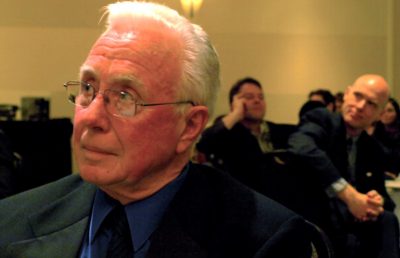 Bob Rupert, a widely respected and influential Canadian journalist, journalism educator and newspaper union leader, died on March 21 at age 85.
Bob Rupert, a widely respected and influential Canadian journalist, journalism educator and newspaper union leader, died on March 21 at age 85.
Rupert was a professor in Carleton’s journalism program for 25 years before his retirement in 2003. “He helped launch the careers of hundreds of students,” noted a family obituary published this week in the Ottawa Citizen.
He was just as well known in journalism circles for his leadership of the Ottawa Newspaper Guild and the wider union movement in the North American news industry during a pivotal era of reform in the 1960s and ’70s.
Rupert was, as well, a tireless champion of the Indigenous press in Canada for decades, training practitioners in First Nation and Inuit communities across the country and advocating for sustainable government funding of Indigenous news organizations.
Shaped by his colourful early career as a reporter with the Toronto Telegram and Ottawa Citizen, Rupert was a vocal proponent of courageous, accurate and ethical journalism.
“It is a reporter’s job to report the facts. It is not to decide who or what is right or wrong,” he told Indigenous journalists from the Alberta-based publication Windspeaker during a two-day workshop in 1987. “You write the facts and never, never sacrifice your integrity for the wishes of another.”
After his retirement as a journalism professor, Rupert worked as a newspaper editorial consultant in New Brunswick, specializing in the rejuvenation of tired, unambitious publications.
He even relaunched his own journalism career as editor of the province’s independent Carleton Free Press, leading a dramatic makeover that earned the newspaper the President’s Award at the 2008 annual convention of the Canadian Association of Journalists — and a standing ovation for Rupert.
“The Free Press,” the CAJ stated in recognizing Rupert, “is at the forefront of the fight against media monopolies like the Irvings’ that threaten the diversity of voices essential to a properly functioning democracy.”
It was a capstone achievement in a life that has left many legacies for Canadian journalism.
A 2007 history of the Ottawa Newspaper Guild by Ottawa journalist Daniel Drolet summed up the successful, late-’60s push by Ottawa Citizen employees to secure better pay, benefits and working conditions as “the Rupert Revolution.”
A landmark labour action took place in July 1970 — an 11-day walkout in which newsroom staff united with press operators and other Citizen workers to win a five-day workweek for composing room employees. They were still working six days a week long after the two-day weekend had become the norm in workplaces everywhere.
The 1970 clash with management over the five-day workweek was sparked by a mailroom ink spill that a pressman was unfairly ordered to clean up. Within days, in an unprecedented show of solidarity organized by Rupert, all of the Citizen’s unionized workers had walked off the job.
The strike succeeded, and more than 300 Citizen employees and family members celebrated the victory with a summer barbecue at Rupert’s farm near Kemptville. “I thought it was terrific,” Rupert recalled in the Guild history four decades later, describing the moment as the high point of his career.
“The Ottawa Newspaper Guild has altered – for the better – the lives of thousands of journalists and other media employees,” Rupert said.
Drolet credited Rupert with “breathing new life into the Guild before going on to become a major player in The Newspaper Guild at the international level.”
After joining Carleton’s journalism faculty in the late 1970s, Rupert made it part of his educational mission to share his journalism knowledge and experience outside of the classroom with community newspaper volunteers across Ottawa and with Indigenous people across Canada.
When deep cuts to federal funding for Indigenous news organizations were announced in 1990 by Canada’s Progressive Conservative government, Rupert publicly lambasted the decision as short-sighted and unfair.
“It’s one thing to tell Native people they have to accept their share of the attack on the national deficit. Everybody has got to accept some responsibility,” Rupert said in leading a national campaign to restore the lost funding. “But Native newspapers were trying to get on their feet and become self-sufficient — and they were getting there. It seems to me newspapers should have been the last to be cut.”
A pillar of Carleton’s journalism program in the 1980s and ’90s, Rupert specialized in teaching print reporting and ethics. He taught the fundamentals of journalism to thousands of students over the years.
This writer was one of those students. An assignment for Rupert’s second-year reporting class in 1986 was given a deft edit by the professor and then kindly sent to the Citizen for publication — the beginning of a 25-year career at the newspaper and its parent company, where wages and working conditions had been shaped by Rupert’s labour leadership decades before, and where many of the journalists had honed their craft in his classrooms.
There was much more to Rupert than his love of journalism; this was captured well in the Citizen obituary: “Bob was a fan. He had encyclopedic knowledge of bebop-era jazz music and loved NCAA basketball. Bob was an athlete. He was a star middle distance runner and point guard in his youth. He ran marathons into his 70s. Bob loved kids. Nothing made him happier than seeing kids smile. Bob was a believer. He believed in truth, equality and fairness. He stood up for these principles in every aspect of his life no matter the personal cost. Bob was a thorn in the side of anybody he felt violated these principles.”
Rupert died while undergoing hip surgery at Kingston General Hospital. He is survived by his wife Wunnapa Rakpra, was a father to Jane, Jake, Jesse, Jill and Neegan, and a grandfather to Ella, Grace, Patrick, Jesse Jr., Neebin and Ara.
Randy Boswell is an associate professor of journalism and a former Ottawa Citizen reporter and editor
Thursday, March 24, 2022 in General, Journalism News
Share: Twitter, Facebook



